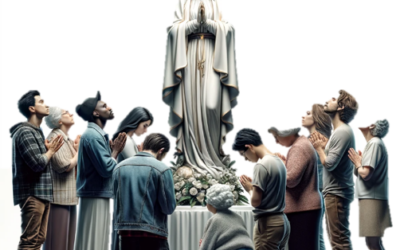The Roman Catholic Church considers Peter to be supreme among Christ’s apostles. This position is known as the Primacy of Simon Peter. It says that Peter is the Vicar of Christ upon whom the Church is built (Matt. 16:18).
- In the Papal bull, Unam Sanctam, November 18, 1302, says “Consequently, we declare a state, define, and pronounce that it is altogether necessary to salvation for every human creature to be subject to the Roman Pontiff.”1
- The First Vatican Council, chapter 1, “We teach and declare that, according to the gospel evidence, a primacy of jurisdiction over the whole church of God was immediately and directly promised to the blessed apostle Peter and conferred on him by Christ the Lord.”
- The First Vatican Council, chapter 3 states that “and so, supported by the clear witness of Holy Scripture, and adhering to the manifest and explicit decrease both of our predecessors the Roman Pontiff’s and of general councils, we promulgate anew the definition of the ecumenical Council of Florence, which must be believed by all faithful Christians, namely that the apostolic see and the Roman Pontiff hold a worldwide primacy, and that the Roman Pontiff is the successor of blessed Peter, the Prince of the apostles, true Vicar of Christ, head of the whole church and father and teacher of all Christian people. To him, in blessed Peter, full power has been given by our Lord Jesus Christ to tend, rule, and govern the universal Church. All this is to be found in the acts of the ecumenical councils and the sacred canons.
Is the Catholic Church’s assertion about Peter true? If it is, then we should see such supremacy in the person of Peter as revealed in the New Testament–the place where spiritual truth must be verified. Unfortunately, we find no such supremacy of Peter in the Scriptures. Let’s examine what the New Testament says in reference to Peter.
Matt. 16:18-19, “And I also say to you that you are Peter, and upon this rock I will build My church; and the gates of Hades shall not overpower it. 19 “I will give you the keys of the kingdom of heaven; and whatever you shall bind on earth shall be bound in heaven, and whatever you shall loose on earth shall be loosed in heaven.”
The Roman Catholic Church claims that this is where Peter is conferred with authority by Jesus since Peter is the rock upon which the church is built. But, this is not the case. CARM has dealt with this issue in the article Is Peter the rock on which the Church is built? where we see that Peter is not that rock. Rather, Christ is the rock on which the church is built. Furthermore, if Matt. 16:18 means that the keys of authority were given to Peter and his successors, why is it that Jesus gives the same authority to all the disciples in Matthew 18:18? Jesus says, “Truly I say to you (the disciples), whatever you shall bind on earth shall be bound in heaven; and whatever you loose on earth shall be loosed in heaven.” What apparently had been granted to Peter only is now extended to all the apostles. Therefore, if Peter is to be the supreme successor of Christ who has the keys to the kingdom to be able to bind and loose, then why is this the same right also granted to the other disciples? If Peter is supreme among the apostles, we can’t infer it from these verses.
Gal. 2:7, “But on the contrary, seeing that I had been entrusted with the gospel to the uncircumcised, just as Peter had been to the circumcised.”
We can see that Peter is the apostle to the Jews, and Paul is the apostle to the Gentiles. If Peter is the pope to the entire Church, why is it that God appointed him an apostle to the Jews and not the Gentiles to which the entire Christian church includes? Remember, Jews are not Gentiles, and Gentiles are not Jews. The Christian church is composed of Gentiles. Of course, there are many Jews who become Christians, but in so doing they are no longer non-Gentiles. So, if Peter was supposed to have had supremacy among the disciples and be the head of the Christian church (which is composed of Gentiles), why did God appoint him to reach out to the Jews? It would make no sense if Peter were the Supreme Pontiff and the primary apostle.
Gal. 2:11-12, “But when Cephas (Peter) came to Antioch, I opposed him to his face, because he stood condemned. 12 For prior to the coming of certain men from James, he used to eat with the Gentiles; but when they came, he began to withdraw and hold himself aloof, fearing the party of the circumcision.”
If Peter is the first pope who had already been given the authority of Christ in Matthew 16:18, then why did Paul the apostle have to rebuke him? The common response here by Roman Catholics is that the papacy speaks with authority and without error, but the men who hold the office can make many mistakes. But the problem here is that there is no way to distinguish the truth of the Roman Catholic Church’s claim that the papacy is descended from an office granted to Peter alone. You see, whenever a pope makes a mistake or speaks something that isn’t true, the man is blamed and is said to not have spoken with authority. But whenever something is “true,” then it is by virtue of his office. So essentially there is no way possible to challenge the claim that the Roman Catholic Church has regarding the office of the papacy. It is, essentially, non-falsifiable. Non-falsifiability means that something cannot be proven to be false. The Roman Catholic Church assumes, without warrant, that Peter is the first pope and then distances itself from heresies and mistakes of those who held the papal office that supposedly descended from him. In this way, it attempts to remain untouchable to cross-examination.
1 Pet. 5:1-2, “Therefore, I exhort the elders among you, as your fellow elder and witness of the sufferings of Christ, and a partaker also of the glory that is to be revealed, 2 shepherd the flock of God among you, exercising oversight not under compulsion, but voluntarily, according to the will of God; and not for sordid gain, but with eagerness;”
If Peter was supreme among the apostles, why does he state that he is a fellow elder instead of asserting his supremacy? Did Peter not recognize his position given to him by Christ? The Roman Catholic Church certainly affirms the primacy of the papal office as cited above. Apparently, the Roman Catholic pope has no problem proclaiming such self-affirmations. Yet, this is not what Peter does in scripture. One has to wonder why the pope in the present Roman Catholic Church does not follow the lead of Peter who they claim to follow. Nevertheless, Peter does not affirm his own supremacy. In fact, he does the contrary by saying he is a fellow elder and witness of the sufferings of Christ.
Questions
- Where is the evidence that Peter ruled the other apostles?
- If Peter is supreme among the apostles, why does he never refer to himself as such?
- If Peter is supreme among the apostles, why do none of the other apostles refer to him in such a way?
- If Peter is supreme among the apostles, why is he listed second in the list of the pillars of the church in Gal. 2:9?
- If Peter is supreme among the apostles, why is he rebuked by Paul in Gal. 2:11 for Peter’s error in doctrine?
- If Peter is supreme among the apostles, why did Jesus not appear to him first after the resurrection? That privilege went to Mary Magdalene (Mark 16:9-11).
- If Peter is supreme among the apostles, why did he write only two N.T. books while Paul, the apostle to the Gentiles (Gal. 2:7), wrote 13?
References
| 1↑ | Cited from The Roman Catholic Controversy, by James White, p. 107 |
|---|





